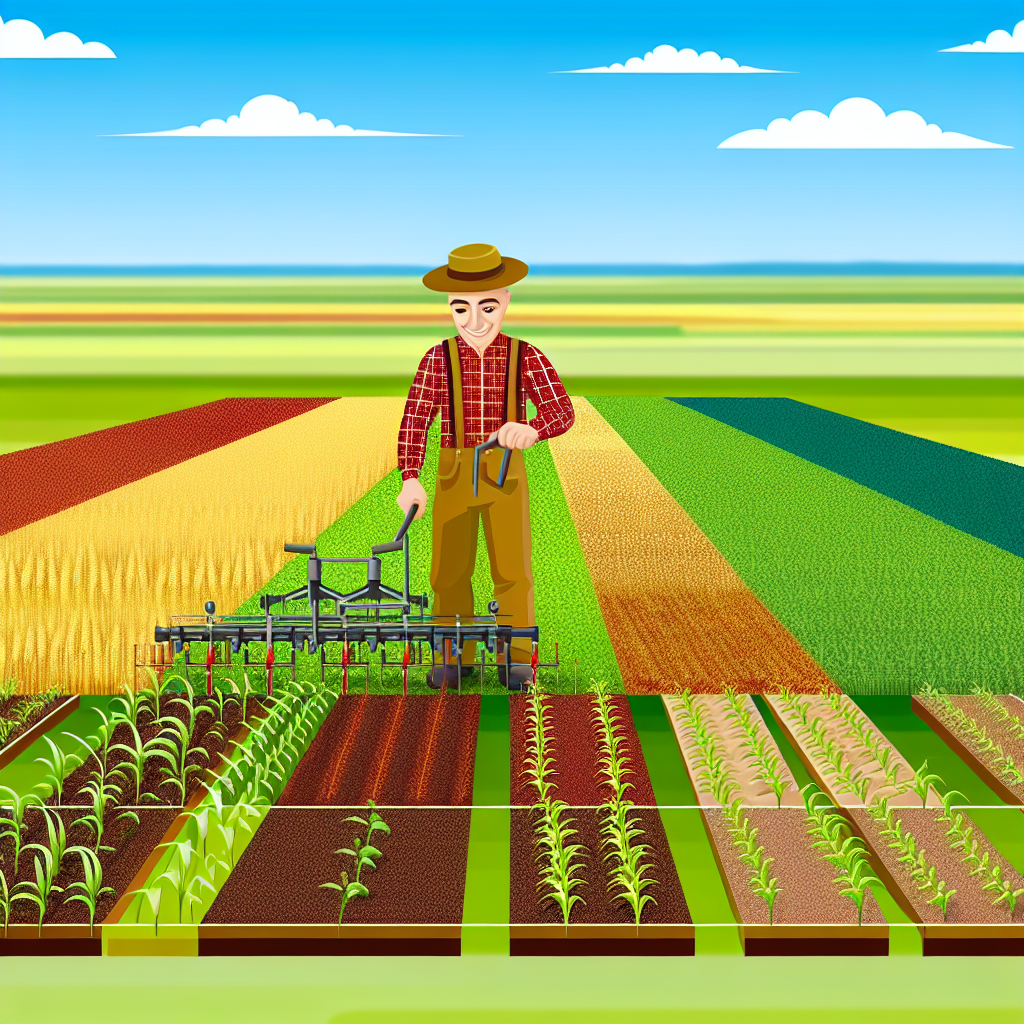Enhancing Soil Health through Crop Rotation
Understanding Crop Rotation
Crop rotation involves alternating different crops in a specific sequence.
This practice interrupts pest cycles and improves soil structure.
Additionally, it allows for more effective nutrient management.
Benefits of Crop Rotation
One of the main advantages is the improvement of soil fertility.
Crops like legumes can fix nitrogen in the soil, enhancing nutrient levels.
Furthermore, varied root structures from different crops improve soil aeration.
This leads to better water infiltration and reduced erosion.
Reducing Pests and Diseases
Crop rotation disrupts the life cycles of pests and pathogens.
For instance, rotating non-related crops can decrease disease prevalence.
As a result, farmers can reduce reliance on chemical pesticides.
This promotes healthier ecosystems and more sustainable farming practices.
Enhancing Biodiversity
Implementing diverse crop systems increases biodiversity in agricultural settings.
Greater biodiversity supports beneficial insects and microbial communities.
This balances the ecosystem and improves overall soil health.
Ultimately, healthier soils lead to more resilient farming systems.
Transform Your Agribusiness
Unlock your farm's potential with expert advice tailored to your needs. Get actionable steps that drive real results.
Get StartedEconomic Advantages
Practicing crop rotation can also yield economic benefits.
Diverse crops can lead to higher marketability and price stability.
Farmers may also experience reduced costs associated with pest management.
Moreover, it helps in spreading risk against crop failures.
Improving Pest and Disease Resistance with Diverse Plant Species
Enhanced Biodiversity
Diverse crop systems significantly enhance biodiversity in agricultural ecosystems.
This increased biodiversity attracts beneficial insects and pollinators.
Additionally, it introduces natural predators for common pests.
As a result, farmers can rely less on chemical pesticides.
Reduced Vulnerability
Diverse plant species can reduce the overall vulnerability of crops.
When different species grow together, diseases can spread less easily.
This phenomenon is known as the dilution effect.
Furthermore, various species can share resources, enhancing resilience.
Soil Health Improvement
Diverse crops contribute to better soil health.
Different root structures promote soil aeration and nutrient uptake.
Moreover, diverse plants can enhance organic matter in the soil.
This combination leads to improved soil structure and fertility.
Crop Rotation Benefits
Implementing crop rotation with diverse species offers numerous benefits.
It helps interrupt pest and disease cycles effectively.
This strategy minimizes the likelihood of outbreaks in subsequent crops.
Moreover, rotating crops can enhance soil nutrients and prevent depletion.
Case Studies and Research Findings
Research shows diverse cropping practices lead to lower pest populations.
For instance, studies in California revealed diverse cover crops reduced aphid numbers.
Conversely, monoculture systems saw significant pest outbreaks.
Similar findings emerged in organic farming systems in Europe.
Showcase Your Farming Business
Publish your professional farming services profile on our blog for a one-time fee of $200 and reach a dedicated audience of farmers and agribusiness owners.
Publish Your ProfileDiverse crop systems play a vital role in pest and disease management.
This approach fosters a healthier agricultural ecosystem.
Ultimately, these practices contribute to sustainable farming solutions.
Increasing Agricultural Biodiversity and Ecosystem Resilience
Enhancing Ecosystem Stability
Diverse crop systems improve ecosystem stability significantly.
They promote various species interactions, which bolster resilience.
In diverse farms, different crops can thrive under varied conditions.
This adaptability helps ecosystems withstand pest outbreaks.
Furthermore, healthy diversity minimizes the risk of total crop failure.
Improving Soil Health
Crop diversity contributes to improved soil health.
Different plants bring varied nutrients to the soil.
Some crops can break compacted soil, enhancing water infiltration.
Planting cover crops reduces erosion and maintains soil structure.
In addition, varied root systems help prevent nutrient depletion.
Boosting Pest Control
Natural pest control improves with diverse cropping systems.
Beneficial insects find habitats among diverse plants.
This increases the likelihood of natural pest predation.
A varied plant community disrupts pest life cycles effectively.
Moreover, this approach can reduce the need for chemical pesticides.
Enhancing Pollinator Support
Diverse crops provide essential resources for pollinators.
Flowers attract bees and other pollinators throughout the growing season.
Healthy pollinator populations increase crop yields significantly.
Additionally, diversified landscapes create suitable habitats for various species.
Protection of these pollinators is crucial for agricultural productivity.
Adapting to Climate Change
Diverse cropping systems enhance resilience to climate variability.
Different crops may respond optimally to shifting climate conditions.
Such adaptability supports food security amid changing environments.
By diversifying crop selections, farmers better manage risks.
This proactive approach helps ensure stable production levels.
Learn More: Gray Water Recycling Techniques for Agricultural Use
Optimizing Resource Use Efficiency in Diverse Farming Systems
Enhanced Soil Health
Diverse crop systems improve soil structure and fertility.
This diversity enhances microbial activity and nutrient cycling.
Additionally, it reduces soil erosion and compaction risks.
Efficient Water Use
Crop diversity allows for varied water needs among plants.
Some crops can thrive in drier conditions, reducing overall water consumption.
Moreover, deep-rooted plants access water from deeper soil layers.
Pest and Disease Management
Diverse crops can disrupt pest life cycles and reduce outbreaks.
This diversity minimizes reliance on chemical pesticides.
Furthermore, beneficial insects are attracted to varied plant types.
Increased Biodiversity
Diverse farming systems support a greater variety of species.
This biodiversity creates more resilient agricultural ecosystems.
Showcase Your Farming Business
Publish your professional farming services profile on our blog for a one-time fee of $200 and reach a dedicated audience of farmers and agribusiness owners.
Publish Your ProfileAs a result, farms can better withstand environmental stressors.
Economic Benefits
Diverse crops can lead to multiple revenue streams for farmers.
This approach mitigates risks associated with market fluctuations.
Moreover, farmers can capitalize on niche markets for specialty crops.
Carbon Sequestration
Incorporating diverse crops enhances carbon storage in soils.
This reduction in atmospheric CO2 contributes to climate change mitigation.
Consequently, diverse systems offer environmental and economic incentives.
Gain More Insights: Integrating Circular Economy in Farm Waste Management
Economic Benefits of Crop Diversity in Market Opportunities
Increased Revenue Streams
Diverse crop systems generate multiple revenue streams for farmers.
This reduces dependency on a single crop, providing financial security.
When farmers diversify, they can tap into various market segments.
Different crops can cater to specific consumer preferences and demands.
As a result, this diversity often leads to increased overall profits.
Resilience Against Market Fluctuations
Diverse crops enhance resilience against unpredictable market shifts.
By having various products, farmers can adapt to price changes effectively.
For instance, if one crop’s price drops, another may remain stable.
This balance helps maintain a steady income throughout the year.
Farmers can also leverage crop rotation to optimize market timing.
Access to Niche Markets
Crops with unique qualities often attract niche markets.
Organic produce, heritage varieties, and specialty grains represent such opportunities.
These markets often offer higher profit margins than conventional crops.
Additionally, consumers are increasingly seeking sustainable options.
This demand positions diverse crop systems favorably in the marketplace.
Innovation and Collaboration
Diverse cropping practices foster innovation among farmers.
They can experiment with various planting techniques and crop combinations.
Collaboration with agronomists often leads to more efficient practices.
Furthermore, sharing knowledge enhances overall farming practices within communities.
Such innovations can further improve market competitiveness for diverse farmers.
Gain More Insights: Soil Health Practices For Sustainable Farming

Impacts on Climate Change Mitigation and Adaptation Strategies
Enhancing Soil Health
Diverse crop systems improve soil health significantly.
They promote a variety of root structures.
These root systems enhance soil aeration and water retention.
Furthermore, diverse crops contribute to organic matter content in the soil.
This organic matter helps sequester carbon, mitigating climate change.
Reducing Pest and Disease Pressure
Diverse cropping practices decrease pest outbreaks.
Different plants can disrupt pest life cycles.
As a result, fewer chemical interventions are necessary.
This reduces the agricultural carbon footprint.
Improving Resilience to Climate Variability
Diverse crop systems can withstand extreme weather more effectively.
They provide a buffer against droughts and floods.
Showcase Your Farming Business
Publish your professional farming services profile on our blog for a one-time fee of $200 and reach a dedicated audience of farmers and agribusiness owners.
Publish Your ProfileMoreover, varying plant types utilize different soil nutrients.
This reduces the risk of total crop failure during climate extremes.
Optimizing Water Use
Diverse crop systems enhance water efficiency in agriculture.
Some plants are more drought-resistant than others.
Integrating these plants allows farmers to minimize water use.
This practice is crucial in regions facing water scarcity.
Contributing to Biodiversity Conservation
Diverse crop systems support various species in the ecosystem.
They create habitats for beneficial organisms.
These organisms include pollinators and natural pest controllers.
Additionally, this biodiversity helps maintain ecosystem balance.
In turn, a balanced ecosystem can better adapt to environmental changes.
Facilitating Sustainable Practices
Diverse cropping encourages sustainable farming methods.
Practices such as crop rotation become more manageable.
Farmers can introduce cover crops to enhance soil health.
Moreover, these systems promote integrated pest management strategies.
Economic Benefits
Diverse crop systems offer economic advantages to farmers.
They can reduce dependency on a single crop type.
This diversification protects farmers from market fluctuations.
Additionally, it may lead to improved crop yields and quality.
Ultimately, it supports long-term agricultural sustainability.
You Might Also Like: Soil Regeneration Techniques For Modern Farms
Cultural and Nutritional Benefits of Growing a Variety of Crops
Enhancing Diet Diversity
Growing multiple crop varieties enriches our diets with varied nutrients.
Each crop offers unique vitamins and minerals essential for health.
Consequently, a diverse diet helps in preventing nutritional deficiencies.
Moreover, it encourages culinary creativity and cultural exchange.
Preserving Traditional Knowledge
Diverse crop systems safeguard traditional agricultural practices.
Local farmers possess invaluable knowledge passed down through generations.
This knowledge includes the best planting times and crop rotation practices.
In turn, preserving these traditions strengthens community ties.
Boosting Food Security
Diverse cropping systems enhance food security at local and global levels.
They mitigate the risk of crop failure due to pests or climate change.
This resilience ensures a steady food supply for communities.
Consequently, it promotes economic stability and reduces reliance on imports.
Promoting Ecological Sustainability
Variety in crops improves soil health and fosters biodiversity.
Different plants contribute to beneficial insect habitats and pollinator support.
Thus, diverse crop systems contribute to a balanced ecosystem.
Additionally, they reduce the need for chemical fertilizers and pesticides.
Creating Economic Opportunities
Diverse crop systems generate multiple income streams for farmers.
Farmers can market a range of products, attracting various customer segments.
Moreover, they can adapt to market demands quickly by rotating crops.
Showcase Your Farming Business
Publish your professional farming services profile on our blog for a one-time fee of $200 and reach a dedicated audience of farmers and agribusiness owners.
Publish Your ProfileThis adaptability provides a safety net during market fluctuations.
Reducing Reliance on Chemical Inputs through Polyculture Practices
Overview of Polyculture
Polyculture involves growing multiple crops in the same space at the same time.
This practice contrasts with monoculture, where only one type of crop is grown.
By diversifying crops, farmers enhance resilience in their agricultural systems.
Moreover, polyculture mimics natural ecosystems, promoting biodiversity.
Benefits of Reduced Chemical Inputs
One significant advantage of polyculture is reduced reliance on chemical inputs.
Farmers can utilize natural pest control methods effectively.
Diverse crops attract beneficial insects, which help manage pests.
For instance, planting flowering plants alongside main crops draws pollinators.
This practice fosters a balanced ecosystem in farmland.
Enhanced Soil Health
Polyculture improves soil health through diverse root systems.
Different crops contribute unique nutrients to the soil.
Additionally, varied plant cover minimizes erosion and runoff.
Cover crops, for example, prevent soil compaction and enhance organic matter.
Improved Pest Management
Diverse crop systems disrupt pest cycles effectively.
When various plants grow together, pests find it harder to locate their hosts.
This natural pest management reduces the need for synthetic pesticides.
Farmers can achieve healthy yields without relying heavily on chemicals.
Resilience and Adaptability
Polyculture systems are more resilient to environmental changes.
Diverse crops spread risks by providing multiple harvests.
This approach supports food security and stability for communities.
Farmers can adapt to market demands with varied crop options.
Consumer Awareness and Market Demand
Increasing consumer awareness drives demand for sustainable practices.
Many consumers prefer produce grown with minimal chemicals.
Farmers adopting polyculture can meet this growing market preference.
Consequently, they can enjoy better pricing and customer loyalty.
Additional Resources
Long-Term Evidence Shows that Crop-Rotation Diversification …




